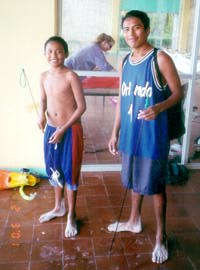
Hunters home from the sea. Nina welds float bags.
ADVENTURES AND ORDEALS WITH A FOLDING PROA
ON THE YUCATAN COAST
Part 1. The first part. Cancun.
Click on any photo to see a higher resolution (~100k) version. Copyright 2001 Tim Anderson
It was the morning of Feb 1, 2001 in Cambridge, Massachusetts. Nina and I were using a household iron to weld together float bags. Our taxi started honking outside. Our folding outrigger canoe wasn't done. We'd been up all night working on it. We'd have to finish it in Mexico. Nina ran to the door and carried the luggage that was ready out to the cab. I dumped a bucket of water over myself and put on clothes that didn't stink. Then I swept the tools and materials from the table into a bag. The iron was still hot so I carried it in one hand.
We flew to Cancun with our 3 checked bags of folding
proa parts. Cancun is at the northeastern tip of the Yucatan peninsula.
"Yucatan" is Mayan for "I don't understand you". When
the Spanish first landed they asked "Where the hell am I?" And
they always got the same answer. "I don't understand you". And
the name stuck.
We assembled the boat at the big decrepit Cancun youth hostel and camped
in their yard under a mosquito net. We were under some palm trees on grass
next to the beach. Nina's quite a savage and a good sport. At her insistance,
we brought no tent or blanket. That night Nina said "I just remembered
that I get really cold whenever I go to the tropics." We sewed the
sail by hand. Welded together some more float bags with the iron. It wasn't
easy because iron kept getting too hot or too cold. Either the local electricity
was unstable or the previous owner had thrown the iron away for a reason.

Hunters home from the sea. Nina welds float bags.
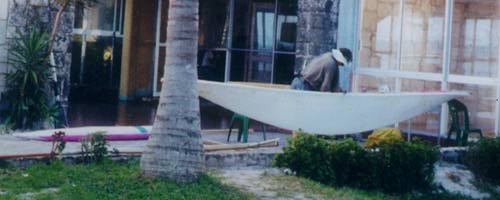
Lashing outrigger booms.
We went to a local madereria (lumberyard) and got
some nice yellow pine 2x2's from Chiapas. Hard, straightgrained, hand-ripped
with a chainsaw. Also a bunch of smaller sticks for the deck lattice. This
wood was so good I didn't use all the aluminum tube I'd brought.
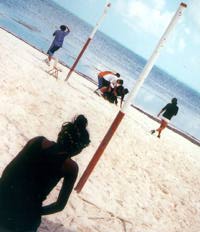
The hostel is also a youth center. A dance troupe attempting to baptize
one of their members.
The Narrative:
After about 3 days we had a boat and were sick of Cancun.
Isla Mujeres was just visible on the horizon if you looked the right way
and squinted. We packed our stuff into the hull, inflated the float bags,
and paddled out from shore. Various boat failures and fiascos ensued. The
outrigger flopped over and threatened to come detached from the rest. Those
two lashed dowels weren't a strong enough structure. We dragged it to shore
and draped some of our clothes on the outrigger platform to dry. I lashed
on some more sticks while Nina slept under a blue tarp. We ended up sleeping
there on the beach in front of a hotel.
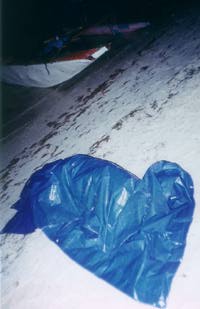
Nina sleeping under a tarp on the beach.
"HMS Pitywick" seemed like a good name for
the boat.
At dawn a boy guard from the hotel stood over us tapping his clip-board.
We packed our stuff into the boat and tried again.
When we were out of the shallows we hoisted sail and started sailing.
Breeze was five or six knots from the east, and that's about how fast we
were
sailing north. The sun was bright, the water all shades of turquoise. We
were completely covered up from the sun like ninjas or Farsi women.The best
part of our garb was floral lycra ski masks. Mexicans said "Marcos!"
and smiled when they saw us, cuz we reminded them of the famous Zapatista.
I've lost track of how many times I've backwinded the sail and had it come
crashing down on top of us. It must have happened at least once on the trip
across. As we got farther from land the waves gradually built up, and once
we were moving there was spray. The hull was mostly full of float bags,
but there was no deck and the gunwales were round. Gunwales are always square.
If they are round the water doesn't get directed outward. It gets flipped
right into the boat. Now I know and you know too. Our small 1.25" bailer
pump (Beckson Thirsty-Mate model 18pf) wasn't enough to keep up with it,
especially while sailing required both hands. We stopped a few times and
bailed it out.
Eventually I got tired and curious about what would
happen if we stopped bailing. We let the hull fill up and we kept sailing.
We didn't go as fast and made more of a wake. The akas and deck were just
above the water and waves splashed more and hit us. We still sailed in the
direction we wanted, and the bows didn't dive. The flared bow with its rake
and sheer came up immediately when it plowed through a wave. I'd read that
5 degrees of pitch was optimal for a planing surface, and it seemed to work
well.
The float bags had lost some pressure from being cooled off by the water.
Nina and I discussed this and scavenged our brains for bits of education.
pV = nRT. The Ideal Gas Law. Pressure times Volume equals Bignumber times
Bignumber times Temperature. In other words, a gas swells and contracts
with temperature a linear way, and vice versa. When you pump air it gets
hot, and air that leaks out is cool.
The first Bignumber 'n' is Avogodro's Number, the number of gas molecules in a Mole. Like the animal. Mole (pronounced mole-eh, like Ole!) is a type of food that people with vowelish names like to eat. It comes in jars. It's a bitter chocolate sauce they put on meat. Try not to think about that. Think of it as jelly. Senor Avogodro put his chemicals in these jelly jars, so he came to think of that as a standard unit. His neighbors in the monastery had piles of these empty jars too, so they fell right in. English scientists bought his books rather than going to the lectures, because the cafeteria only had bitter chocolate chicken and things like that. The English eggheads just wanted lard and a boiled steak stuck on a knife. So the vowel-speakers didn't exactly beg them for dinner either.
The point is that the idea and the spelling caught
on. But that voiced 'E' at the end didn't make it all the way from the Mediterranean
to the Elfin Isle. Like so many other vowels, it got knocked out by culture
shock.
So now we pronounce it the same as the blind kin-of-shrew that puts ridges
on the green.
Lucky for us one of those jars held just about 6.0221x10**23 molecules of
something. I say lucky because if it was a round number it might seem more
important. If it was a number someone could remember they might not have
noticed that they never needed the actual number in this equation, just
the ratio.
The other Bignumber 'R' is the "Ideal Gas Constant", another seemingly
arbitrary number you don't need to remember. They jammed that one in here
so that when an ideal gas (which doesn't exist) is cooled down to absolute
zero (which can't be done) it has zero volume (which also doesn't exist,
except as an idea. Isn't Zero great?) This was done so when they measured
the gas once and plotted the answer, they could draw a straight line through
it pointing at zero
and know roughly what else was going to happen. But if you measure it twice
under different conditions you can draw the straight line between those
two points. Then you just need to know the relationship(draw the straight
line), not the magic numbers to get your answer.
And that was all they wanted in the first place. If I sail into cold water,
will my inflated boat sink and drown me?
In our case, the water would have to be ice, and then we could walk. Meantime
our deck was just above the water, or just under it, depending on the waves.
We approached the island at some rocks where people were snorkeling.
A skiffload of park rangers came over and handed us a map.
It was fumbled and fell in the water. We grabbed it and thanked them.
It had pictures of the fish we might see here. We were at an underwater
park.
We switched ends and sailed north along the coast looking for a place to
camp.
A guy on the van from the airport had told us Mujeres was a "quiet
little fishing village" and "nothing like Cancun". It seemed
pretty built up to us.
We'd seen a stretch of coast with no buildings from sea, and we headed for
that.
Other than that the coast seemed fully "developed" with houses
and hotels.
There was a "Se Vende" (for sale) sign and a long beach with no
houses. We
dragged the boat ashore and let it drain. We propped the sail up on the
beach
and took a much-needed nap in the shade.
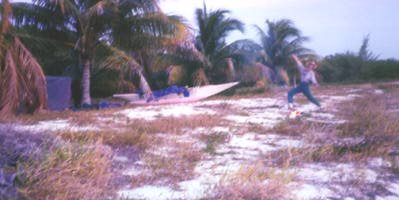
Nina cooking and dancing on Isla Mujeres.
An american couple walked down the beach and set up their picnic a bit away
from us. We walked into the scrub a little bit and enjoyed a bowel movement.
Nina was shy and needed good cover. The area reminded me of a no-man's-land
at home in the midwest. Some trash, some puddles, a network of dirt roads
from people avoiding the puddles. Like a place by the river where kids went
to drink beer by a fire. With car doors open to let out the heavy metal
music from cracked speakers.
But here the sound was euro-pop and a dj from the ferry terminal to the
north.
As we walked back to our beach, a young mexican on a bicycle rode into a
clearing, looked at us with a strange smile. After scanning the area he
turned and rode away. We went back to our beach, put up the mosquito net,
hung up some clothes to dry, ate some food and generally took it easy. Occasionally
some people came strolling down the beach. We were planning to walk back
to the reef park for a snorkel. An elderly couple of deeply-tanned Germans
strolled up and warned us that the last people to camp in this place had
been robbed. Scandinavians, and camped exactly where we were. So we decided
to stay put. Nina started a fire of branches and dry coconuts for a pot
of lentils and rice, her staple. I took a chicken neck out of the package,
tied a string to it, threw it into the shallows. Evening was coming. A cloud
of vicious no-see-ums came out and started torturing us.
Down the beach with machineguns and black uniforms
came two men. Nina's spanish is perfect. She was raised bilingual in Berkeley
Ca. "A part of Mexico" we told the people we met. They loved this
line, but we didn't get to use it on these unfriendly guys. "No fires
allowed here." "A very isolated place." They were angry looking
and stood there for a while, while Nina promised she'd put out the fire
and get rid of the coals too. One talked while the other glared and fondled
his gun. After they left we weren't sure what to do. It was too late to
find another place to camp. The wind had died so we couldn't sail, besides
which it was getting dark.
Our Lonely Planet Yucatan guidebook had whole sections on how bad Mexican
cops are, and how the next town over (Playa del Carmen) was the best place
for a tourist to get robbed, murdered, or raped, and don't report the rape
to the police, cuz you might recognize the rapist as one of the cops and
then he'll kill you for sure. Nina thought they were fondling their guns
way too much and that when they kept saying "very isolated place"
it was a threat of what they would do later that night if we stayed.
We decided to take our chances on the water and return to Cancun. Nina's
coconuts had made beautiful coals. She finished cooking, carried up a tarpload
of sea water, soaked and buried the fire. A trick she'd learned from helicopters
scooping water with tarps to dump on forest fires. I pulled in my line and
there was a nice little crab hanging from the chicken neck. It was catch-and-release
though due to the fortunes of war. The other chicken necks were smelling
bad. They remained as a gift to local dogs.
We packed our stuff into the boat and started paddling.
It was going to be a long night. Poor Nina hadn't had a decent night's sleep
for the month preceeding cuz of her residency program. Working 100 hours
in four days, etc. Old doctors do this to young doctors to make sure all
doctors are crazy. If sleep deprivation like that happens in a prison camp
it's called torture and is a human rights violation. If truck drivers do
it it's considered very dangerous. Doctors are somehow expected to go days
without sleep making life-or-death decisions and complicated procedures.
It's a way to hire a doctor for $2 an hour.
The dark, the waves and the possibility of distant boats suddenly not being
distant and running us down started bothering Nina. I attempted to take
her mind off it with tales another trip, this a five-day trip with Mike
Anderson (no relation) that ended up taking five weeks. My favorite part
is when Mike trades his pretty little Porsche 914 for a '63 Corvair in chicken-coop
condition, then gushes a waterhose into the running engine's carb "to
loosen up the carbon". Which it definitely did. This in a junkyard
on market street in San Diego. Bloody syringes littered the ground. The
junk cars mostly had people in them. Working whores and drug dealers. Shriveled
little homeless people the color of dirt and dust that covered everything.
I was scared to death but I stuck out my belly and grinned. If you walked
around there at night and you didn't seem cautious, you were maybe stupid
or armed, and nobody really wanted to find out for sure.
Finally we got back to the Hostel. Everything we had was soaked again. There's
a pattern here. Everything in the boat always got completely soaked. Even
if it was in a so-called "dry bag". Every time we landed we had
to dump and wring everything out and hang it up, even the guidebook. The
guidebook claimed to be printed on all-rag paper and stitch-bound to survive
this sort of abuse, which it did admirably. Camping without equipment in
the yard in our wet clothes seemed ordeal rather than adventure. I suggested
we get an actual room this time. What extravagance! The thought hadn't occurred
to Nina, who as I mentioned before is a true savage. But she was willing
to try it. Fortunately one of the women who ran the place was awake. For
three dollars more than shivering in the yard we got clean sheets and pillows
in a room to ourselves. Ahhh!
No drowning, robbing, raping, or murdering for us! We win!
The next day we rented a car.
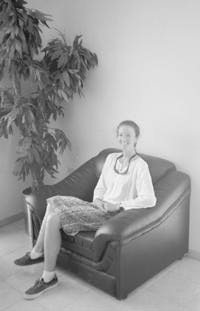
Nina in the car rental office. The furniture,
plants, and airconditioning made her laugh.
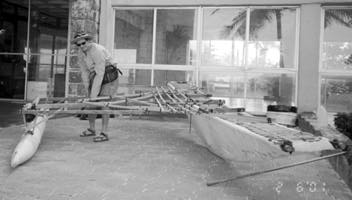
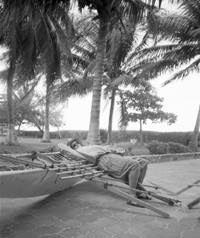
I cut the outrigger booms off at 6 ft with my
folding saw. We rolled up some float bags in a tarp and put it on the roof
of the car.
We loaded the boat on top the car and drove south.
FINALLY OUT OF CANCUN!! Ahhh. We win again.
In the trunk were five new pvc airmattresses from the discount store "Chedraui".
(they specialize in cheese). These were to stuff into the hull. To puff
out the sides and make it ride higher. Also we had a heavy silver polytarp
to deck the hull if that became necessary.
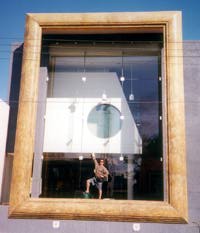
A picture frame shop in Ciudad Cancun.
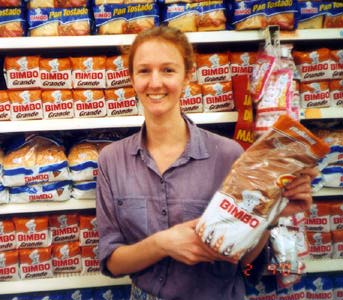
Bimbo brand bread is everywhere in Mexico.
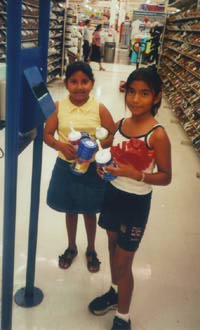
Mayan girls using the price scanner in the Cancun Walmart.
End of Part 1. Cancun.
Copyright 2001 Tim Anderson